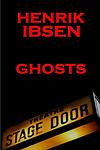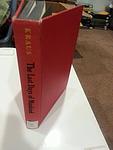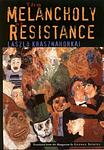The Greatest Norwegian, Austrian "Drama, Fiction" Books Since 1900
Click to learn how this list is calculated.
This list represents a comprehensive and trusted collection of the greatest books. Developed through a specialized algorithm, it brings together 305 'best of' book lists to form a definitive guide to the world's most acclaimed books. For those interested in how these books are chosen, additional details can be found on the rankings page.
Genres
Drama is a genre of literature that typically deals with serious and emotional themes, often exploring the complexities of human relationships and the struggles individuals face in their lives. These books often feature intense character development and intricate plotlines, delving into the depths of human experience and the challenges of navigating the world around us. From family dramas to political intrigue, the drama genre encompasses a wide range of stories that aim to captivate readers with their raw and powerful storytelling.
Countries
Date Range
Reading Statistics
Click the button below to see how many of these books you've read!
Download
If you're interested in downloading this list as a CSV file for use in a spreadsheet application, you can easily do so by clicking the button below. Please note that to ensure a manageable file size and faster download, the CSV will include details for only the first 500 books.
Download-
1. The Piano Teacher by Elfriede Jelinek
"The Piano Teacher" is a dark exploration of power dynamics, sexuality, and repression. The story revolves around a piano teacher at a prestigious music school in Vienna who lives with her overbearing mother in a state of emotional and sexual repression. Her life takes a turn when she becomes sexually involved with a young, self-assured student. The relationship, marked by sadomasochistic games and emotional manipulation, spirals out of control, leading to a tragic end. The book is a profound critique of bourgeois values and the oppressive structures of society.
The 1058th Greatest Book of All Time -
2. House with the Blind Glass Windows by Herbjørg Wassmo
"House with the Blind Glass Windows" is a poignant tale of a young girl growing up in Norway during the 1950s. The narrative explores her struggles with family secrets, abuse, and the oppressive nature of her small, rural community. The protagonist's journey towards understanding and overcoming her traumatic past forms the crux of the story, which is set against the backdrop of post-war Europe.
The 1096th Greatest Book of All Time -
3. Confusion by Stefan Zweig
"Confusion" is a compelling narrative that explores the intense and passionate relationship between a student and his charismatic professor. Set in the early 20th century, the story unfolds as the protagonist becomes entangled in the professor's personal life, discovering his mentor's secret past, his struggling marriage, and his hidden homosexual desires. The book presents a profound exploration of human emotions, identity, and the complexities of love, against the backdrop of the societal norms of the time.
The 2026th Greatest Book of All Time -
4. Selected Plays of Henrick Ibsen by Henrik Ibsen
This compilation includes a selection of plays by a renowned Norwegian playwright, who is often referred to as the father of realism. The collection showcases his talent for exploring complex human emotions, societal expectations, and moral dilemmas. The plays often feature strong female characters, a rarity for the time, and challenge the norms of the 19th-century society, making them timeless and relevant even today.
The 2409th Greatest Book of All Time -
5. Out Stealing Horses by Per Petterson
The novel is a poignant exploration of a man's relationship with his father and his own identity. Set in Norway, it follows the protagonist's decision to live in solitude after the death of his wife and sister. Through a series of flashbacks, he recalls his childhood, particularly the summer of 1948 when he lived with his father in the country. As he delves into his past, he uncovers his father's involvement in the resistance during World War II and the lasting impact it had on their relationship and his own life. The narrative intertwines the past and the present, reflecting on themes of loss, betrayal, and the complexity of human relationships.
The 2843rd Greatest Book of All Time -
6. A Sorrow Beyond Dreams by Peter Handke
This book is a poignant exploration of the author's mother's life and her struggle with depression, ultimately leading to her suicide. It provides a deeply personal and raw account of the author's attempts to understand his mother's despair and the societal constraints that contributed to it. The narrative is a profound reflection on memory, loss, and the complexity of human emotions, offering a stark and moving portrayal of a woman's life in a rigid, post-war society.
The 3045th Greatest Book of All Time -
7. Why Is There Salt In The Sea? by Brigitte Schwaiger
The novel explores the life of a young Austrian woman who finds herself in a stifling marriage with a fisherman in a small coastal village. As she grapples with the mundane and oppressive nature of her daily life, she yearns for freedom and self-discovery. The sea, with its salt, becomes a metaphor for her tears and the bitterness she experiences, as well as the vast possibilities that lie beyond her current existence. Her internal struggle and the choices she faces reflect the broader themes of women's liberation and the search for identity in a world that often limits female autonomy.
The 3747th Greatest Book of All Time -
8. The Last Days of Mankind by Karl Kraus
"The Last Days of Mankind" is a satirical play that provides a critical commentary on the socio-political climate during World War I. The narrative presents a stark portrayal of the absurdity of war and the destructive forces of propaganda, bureaucracy, and nationalism. The author uses a variety of literary techniques, including parody, satire, and direct quotes from contemporary sources, to highlight the folly and tragedy of war. The play is known for its unique style, rich language, and its profound critique of society and culture during a time of great upheaval and conflict.
The 4695th Greatest Book of All Time -
9. Kaspar and Other Plays by Peter Handke
"Kaspar and Other Plays" is a collection of avant-garde, thought-provoking plays that explore deep philosophical questions about language, reality, and the human condition. The titular play tells the story of a young man who learns to speak and, in doing so, is manipulated and controlled by society. The other plays in the collection continue to challenge conventional ideas and push boundaries, offering a unique and profound commentary on the world.
The 5751st Greatest Book of All Time -
10. The Half Brother: A Novel by Lars Saabye Christensen
"The Half Brother" is a compelling narrative that follows the life of a young man named Barnum Nilsen. Born into a Norwegian family with a mysterious past, Barnum navigates through life with a half-brother, Fred, who is both his best friend and his rival. As Barnum grows older, he becomes a successful writer, but his personal life is marked by loss, loneliness, and the weight of his family's secrets. The book is a profound exploration of identity, love, and the bonds of family.
The 6475th Greatest Book of All Time -
11. Selected Plays And Libretti by Hugo von Hofmannsthal
This collection brings together a selection of dramatic works by a prominent figure in the early 20th-century literary world, showcasing his talent for blending poetic language with profound psychological insight. The plays and libretti included span various genres, from historical dramas to adaptations of classic myths, each marked by the author's exploration of themes such as identity, transformation, and the human condition. The works also reflect the author's collaboration with influential composers of his time, contributing to the evolution of opera and theater through his innovative approach to storytelling and character development.
The 7180th Greatest Book of All Time -
12. Plays And Stories by Arthur Schnitzler
"Plays and Stories" is a collection that showcases the work of a prominent writer known for his incisive exploration of psychology and morality in turn-of-the-century Viennese society. The book brings together a selection of his dramatic and narrative pieces, each delving into the complex lives and intimate struggles of its characters. Through a blend of sharp dialogue, intricate character studies, and a keen observation of social mores, the collection reveals the subtle forces at play in love, desire, and power, often highlighting the ironic twists of fate that can alter the course of an individual's life. The writer's work is celebrated for its nuanced depiction of the human condition and its influence on modernist literature.
The 7180th Greatest Book of All Time -
13. Melancholy by Jon Fosse
This book delves into the life of Lars Hertervig, a young and impoverished painter from Norway in the 19th century, who grapples with the torment of unrequited love and the burgeoning realization of his own mental illness. Set against the backdrop of his studies at the Düsseldorf Academy of Art, the narrative explores Hertervig's descent into madness, interweaving his intense relationship with nature, his struggles with societal expectations, and his profound isolation. Through a lyrical and fragmented prose, the novel poignantly captures the essence of melancholy and the artist's tumultuous journey towards understanding his own mind and art.
The 10470th Greatest Book of All Time -
14. Professor Bernhardi by Arthur Schnitzler
The play revolves around a Jewish physician who heads a Viennese clinic and becomes embroiled in a scandal when he prevents a Catholic priest from giving the last rites to a dying patient who is unaware of the seriousness of her condition. His actions, motivated by a desire to preserve the patient's peace of mind, are misinterpreted as anti-Catholic, leading to a public outcry and a power struggle that reflects the deeply ingrained anti-Semitism and political opportunism of the time. The doctor's principled stand becomes a flashpoint for societal and professional conflict, raising questions about ethics, religion, and the corrosive effects of prejudice.
The 10988th Greatest Book of All Time -
15. Tales From The Vienna Woods by Ödön von Horváth
This narrative is a darkly comedic and ironic tale set in 1930s Austria, which delves into the lives of ordinary Viennese citizens as they grapple with the socio-economic pressures of the time. The story revolves around a young woman who, in her pursuit of happiness and escape from a suffocating family, becomes entangled in a series of romantic relationships that lead to disillusionment and tragedy. The work critiques the romanticized vision of Vienna by juxtaposing the city's charming waltzes and idyllic woods against a backdrop of moral decay, hypocrisy, and the looming shadow of fascism.
The 10992nd Greatest Book of All Time
Reading Statistics
Click the button below to see how many of these books you've read!
Download
If you're interested in downloading this list as a CSV file for use in a spreadsheet application, you can easily do so by clicking the button below. Please note that to ensure a manageable file size and faster download, the CSV will include details for only the first 500 books.
Download













